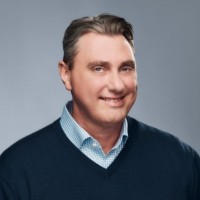(This story is from our Health Tech newsletter. If you’d like to sign up, just click here.)
Circadian Health, a startup that provides virtual specialist care for chronic diseases, has raised $7.5 million.
The Series A round was led by HC9 Ventures, with participation from Texas-based Memorial Hermann Health System. It brings the Florida startup’s total funding to $17.5 million. Circadian also announced that Joan Harvey, president of care solutions at Cigna’s Evernorth subsidiary, is joining the company’s board.
Circadian provides patients with access to specialists in pulmonology, endocrinology, cardiology, and sleep medicine. It was founded in 2023 by Sean Heyniger, a co-founder of telehealth giant MDLive, which was bought by Cigna in 2021, and Chuck Hector, who was MDLive’s chief revenue officer for over eight years. The two saw an opportunity to provide care for conditions they say are largely ignored by incumbent telehealth companies.
 Chuck Hector
Chuck Hector“MDLive, Teladoc, Amwell — they’re all struggling to survive on low acuity medicine and none of them are moving into specialty care, and we see such a huge gap,” Hector, who serves as Circadian’s president, told Endpoints News in an interview. The bulk of healthcare costs are related to chronic diseases, he said, “not sniffles and headaches and toenail fungus. That’s what MDLive and Teladoc address. We’re helping people with afib and sleep disorders and COPD. These are the things that really bend the cost curve.”
Large telehealth providers, while perhaps best known for treating minor conditions, have been trying to shift into providing primary and chronic care. But the publicly traded ones, at least, are dealing with heavy losses.
Teladoc lost $220 million in 2023 and struggled with its 2020 acquisition of diabetes care company Livongo, reporting a $14 billion loss on the deal in 2022. Longtime CEO Jason Gorevic stepped down in February. Amwell, which implemented a reverse stock split over the summer to avoid being delisted from the New York Stock Exchange, lost nearly $700 million last year.
Circadian is in a better position because it focuses on people who are chronically ill, and it’s paid a recurring monthly fee to care for them, whereas telehealth companies focused on acute, urgent needs are paid only when patients get sick and visit with a doctor, Hector said.
Its customers are health plans, including UnitedHealthcare, and providers that take financial responsibility for patient care, such as Optum, VillageMD and Astrana Health. By way of example, in one program, Circadian works with UnitedHealth to prevent expensive hospital readmissions among heart failure patients, Hector said. It monitors the patients in their homes and if they gain a certain amount of weight, a cardiologist checks in to titrate their medication.
Circadian commits to certain metrics, such as hospital avoidance, and if it hits them, it gets a bonus; if it doesn’t, it pays money back, Hector said.
Separately, Circadian is also working directly with employers to treat workers with sleep-related problems, like apnea.
With the fresh funds, Circadian is hiring more doctors and other clinicians, and doing the legwork to get them credentialed with insurers and state Medicaid programs. It’s also planning to keep refining its technology. Hector said that in a year or two, it’s possible Circadian will expand to other specialties, such as kidney care and gut health.